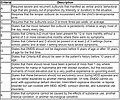Disruptive mood dysregulation disorder
Editor-In-Chief: Prab R Tumpati, MD
Obesity, Sleep & Internal medicine
Founder, WikiMD Wellnesspedia &
W8MD medical weight loss NYC and sleep center NYC
| Disruptive mood dysregulation disorder | |
|---|---|

| |
| Synonyms | N/A |
| Pronounce | N/A |
| Specialty | N/A |
| Symptoms | Severe temper outbursts, chronic irritability |
| Complications | N/A |
| Onset | Before age 10 |
| Duration | Persistent |
| Types | N/A |
| Causes | Unknown |
| Risks | Family history of mood disorders, anxiety disorders |
| Diagnosis | Clinical evaluation |
| Differential diagnosis | Bipolar disorder, Oppositional defiant disorder, Attention deficit hyperactivity disorder |
| Prevention | N/A |
| Treatment | Psychotherapy, medication |
| Medication | Stimulants, antidepressants, antipsychotics |
| Prognosis | Variable |
| Frequency | Unknown |
| Deaths | N/A |
Disruptive Mood Dysregulation Disorder (DMDD) is a relatively new classification of mood disorder in the Diagnostic and Statistical Manual of Mental Disorders (DSM-5), introduced in 2013. It is characterized by severe and recurrent temper outbursts that are grossly out of proportion in intensity or duration to the situation. These outbursts can be verbal or behavioral, and they must occur consistently in at least two settings (e.g., at home and at school) for a diagnosis to be made. DMDD aims to address the need for a better classification of children who were previously diagnosed with pediatric bipolar disorder, but whose symptoms did not fully align with that diagnosis.
Symptoms and Diagnosis
The core feature of DMDD is chronic, severe persistent irritability. This irritability is displayed through frequent temper outbursts that are disproportionate to the situation and inconsistent with the child's developmental level. Between these outbursts, the child's mood is persistently irritable or angry most of the day, nearly every day, and observable by others in the child's immediate social circle. To be diagnosed with DMDD, symptoms must be present for 12 or more months without a break of more than three months. The disorder should be diagnosed between the ages of 6 and 18 years, and the onset must be before the age of 10. It's important to differentiate DMDD from other mood disorders, such as major depressive disorder or bipolar disorder, and behavioral disorders like oppositional defiant disorder (ODD) and attention deficit hyperactivity disorder (ADHD), which can have overlapping symptoms.
Treatment
Treatment for DMDD is multifaceted and typically includes a combination of psychotherapy, medication, and educational interventions. Cognitive-behavioral therapy (CBT) is often used to help the child develop coping mechanisms for anger and frustration. Family therapy may also be beneficial in teaching family members strategies to manage outbursts and reduce conflict. In some cases, medication may be prescribed to treat co-occurring conditions or to reduce the severity of the mood dysregulation, although there is no specific medication approved for DMDD.
Epidemiology
The prevalence of DMDD is estimated to be between 2% and 5% among children and adolescents. It is more commonly diagnosed in males compared to females. The disorder can have a significant impact on the child's social, academic, and family life, often leading to school suspension or expulsion and strained family relationships.
Prognosis
The long-term prognosis for children with DMDD is still being studied, as the diagnosis is relatively new. However, early intervention and treatment are believed to improve outcomes. Without treatment, children with DMDD may continue to experience significant impairments in their social and academic functioning.
See Also
References
Transform your life with W8MD's budget GLP-1 injections from $125.
W8MD offers a medical weight loss program to lose weight in Philadelphia. Our physician-supervised medical weight loss provides:
- Most insurances accepted or discounted self-pay rates. We will obtain insurance prior authorizations if needed.
- Generic GLP1 weight loss injections from $125 for the starting dose.
- Also offer prescription weight loss medications including Phentermine, Qsymia, Diethylpropion, Contrave etc.
NYC weight loss doctor appointments
Start your NYC weight loss journey today at our NYC medical weight loss and Philadelphia medical weight loss clinics.
- Call 718-946-5500 to lose weight in NYC or for medical weight loss in Philadelphia 215-676-2334.
- Tags:NYC medical weight loss, Philadelphia lose weight Zepbound NYC, Budget GLP1 weight loss injections, Wegovy Philadelphia, Wegovy NYC, Philadelphia medical weight loss, Brookly weight loss and Wegovy NYC
|
WikiMD's Wellness Encyclopedia |
| Let Food Be Thy Medicine Medicine Thy Food - Hippocrates |
Medical Disclaimer: WikiMD is not a substitute for professional medical advice. The information on WikiMD is provided as an information resource only, may be incorrect, outdated or misleading, and is not to be used or relied on for any diagnostic or treatment purposes. Please consult your health care provider before making any healthcare decisions or for guidance about a specific medical condition. WikiMD expressly disclaims responsibility, and shall have no liability, for any damages, loss, injury, or liability whatsoever suffered as a result of your reliance on the information contained in this site. By visiting this site you agree to the foregoing terms and conditions, which may from time to time be changed or supplemented by WikiMD. If you do not agree to the foregoing terms and conditions, you should not enter or use this site. See full disclaimer.
Credits:Most images are courtesy of Wikimedia commons, and templates, categories Wikipedia, licensed under CC BY SA or similar.
Contributors: Prab R. Tumpati, MD




